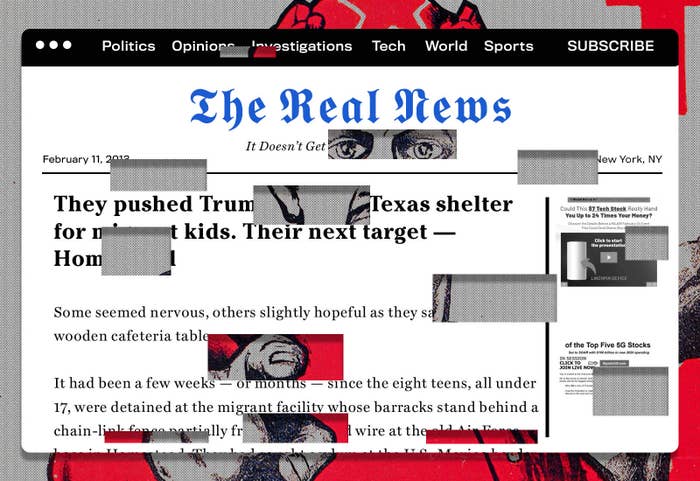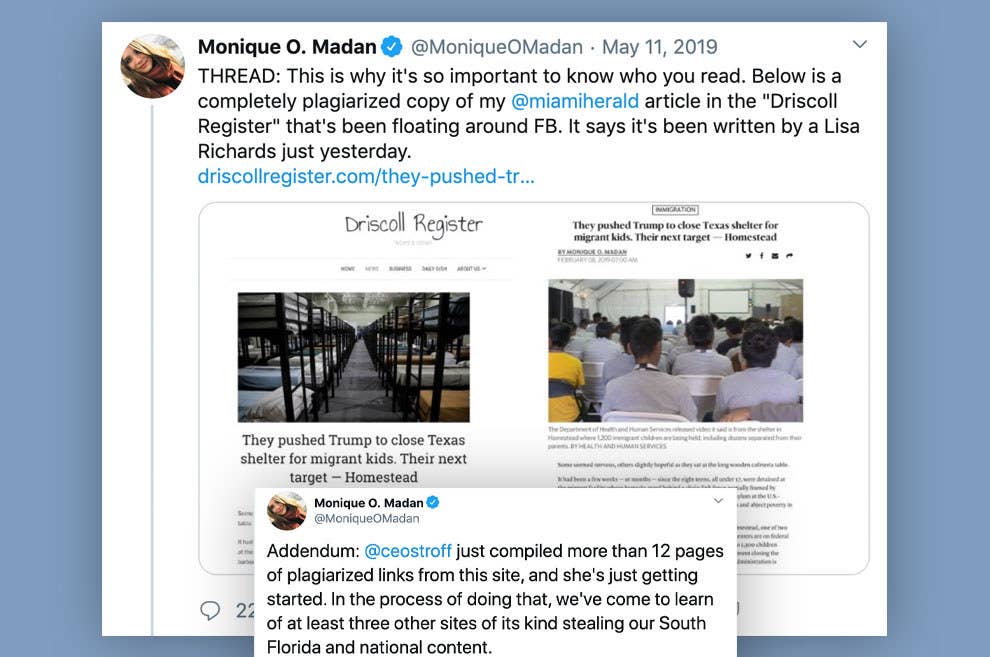As they stole stories from real newspapers, these sites baffled scientists, activists, and journalists. Until now.
Craig SilvermanBuzzFeed News Reporter
Posted on February 6, 2020, at 2:45 p.m. ET

Alex Merto for BuzzFeed News
Jay Pinho and his wife, Victoria, rely on Google Alerts to track the public appearances of US Supreme Court justices on their website, SCOTUS Map. But late last year, the results began to worry them.
“A crop of news [website] domains were popping up that I'd never heard of before, and they were often publishing directly plagiarized pieces from real outlets,” he told BuzzFeed News.
In addition to being plagiarized, the content flooding his Google Alert results was often at least a year old. Adding to the confusion, it was published on websites that at first glance seemed like legitimate local news sites, with names like the Livingston Ledger, Denton Daily, and Hoback Herald. They also noticed another set of financial news sites doing the same thing, with names like Stock Daily Dish and Daily Stock Dish.
“Sometimes their links would represent a large portion of the Google Alerts for news on a given Supreme Court justice for several days in a row, and then they would suddenly disappear from the alert emails,” he said.
The Pinhos didn’t fall for the trap, but other people did — many of whom should have known better.
Stories from these sites have found their way into the tweets of the executive director of Human Rights Watch, the Natural Resources Defense Council, voter rights organizations, gun control advocates, and scientists. One tweet from a political activist that linked to a plagiarized story received more than 13,000 retweets and likes.
People who caught the sites plagiarizing began speculating about the motivations of whoever was running them. One person noticed that their Google Alerts for Julian Assange were flooded with results from the sites, leading them to warn that “cyber marketing tools are being used in the propaganda war against #WikiLeaks.” One researcher labeled the network of sites “a malicious information operation masquerading as a news aggregator.”
Neither was the case. In fact, the plagiarized sites are part of an operation run by a North Carolina man with a background in the financial information industry. And the motivation is simple: money.
A BuzzFeed News investigation has identified a network of roughly 100 sites dating back to at least 2015 that have been plagiarizing stories from major news organizations, masquerading as local news and financial outlets, and manipulating Google News and search results to earn money through ads, through financial email subscriptions, or by referring people to dubious investments.
Domain registration records and other information, including confirmation from a business partner, show that the network is run by Matt McGorty. His brother Tim, who also worked in the financial information industry, is linked to the network via domain registrations, but his role is unclear. The McGortys did not respond to multiple interview requests and a detailed set of questions.

BuzzFeed News
A McGorty site with plagiarized content
These sites show how easy it's been to bypass the procedures Google uses to keep low-quality sites out of Google News. In November, Tara Calishain, an author and professional researcher who runs researchbuzz.me, warned that ”junk news” sites had infiltrated Google News. They were so prevalent in results that she had to reconsider her assumption that sources included in Google News “have been vetted to a certain extent.”
The McGorty sites are also the latest example of how online local news has become polluted by ad fraudsters, political hucksters and operatives, and Russian trolls. These impostors trade on the trustworthiness of local journalism by adopting names that evoke small-town newspapers. Some even adopt the names of now-shuttered outlets that once served communities. They bank on the fact that the average person — and the people in charge of reviewing sites for Google News — will assume the Denton Daily or Jamestown Journal is a real news outlet. And they profit from it.
After conducting an internal investigation, Google terminated two AdSense advertising accounts that belonged to the McGortys. A company spokesperson added that in December, the company made changes to Google News to help keep these kinds of sites out of the service.

@moniqueomadan / Twitter
Public outrage about the sites spiked in May when Miami Herald immigration reporter Monique O. Madan tweeted about driscollregister.com, which was stealing work from her paper.
“People whom I have spoken to in the past, that I've interviewed, were sharing my story — but from another website, and it was [my text] in full and the byline was not my byline,” Madan told BuzzFeed News.
She said the Herald found dozens of examples of ripped-off stories on different sites but was unable to identify the culprits.
BuzzFeed News was able to identify sites in the network and the McGortys by connecting domain registration records, advertising and analytics IDs, the IP address of servers, social accounts and sharing patterns, and content on the websites. Pinho, the cofounder of SCOTUS Map, conducted his own investigation and also attributed the sites to the McGortys.
Their strategy appears to be to seed the sites with plagiarized content to make them appear real. This helps them get accepted into Google News. Once accepted, the sites reprint press releases or content provided by a partner, with an aim at attracting traffic via Google News, Google Alerts, social shares, and search engine optimization. The sites monetized this traffic with ads placed via the Google AdSense network, and referral fees for helping drive sign-ups for a financial information newsletter.
Many of the domain registration records for the sites used the email account retirementplannins@gmail.com. In some cases, that account was accompanied by the name Chris Smith and an address in Destin, Florida. That email address was used to register berkshirehousecleaners.com, the website of a business run by Matt McGorty’s wife. A 2016 Boston Globe article mentioned the business, focusing on how she and Matt spent part of the year living in Destin.
Tim McGorty is linked to the operation via the magaoti@gmail.com email address, which appeared in the domain registration records for dozens of the sites. Tim operates a Facebook profile named Ma Gao Ti that is almost exclusively friends with members of the McGorty family.
Both brothers, who live in North Carolina, began working for NASDAQ in 2013 after being employed by Thomson Reuters, according to their LinkedIn profiles. In 2016, the Boston Globe reported that Matt “works for NASDAQ, updating financial websites.” A NASDAQ spokesperson told BuzzFeed News that the brothers worked for a subsidiary that is now an independent company called Interdo. The company, which was previously called West, offers a suite of digital media products and services, including website and content development. Interdo declined to comment on whether Matt McGorty is a current employee. Tim currently runs a web design and video business.
The earliest McGorty site identified by BuzzFeed News was oraclebeacon.com, active in 2015, according to the Wayback Machine.
The websites often falsely presented themselves as genuine news outlets, divided into two categories: local and financial news.
For instance, the about page of richlandstandard.com described itself as “an independent family-owned media company located in Bedford, Texas.” Another site in the network, riverdalestandard.com, previously described itself as “an independent financial media company located in Buckner, Kentucky.” That domain now claims to belong to a new owner using an even-more misleading description. It’s about page now features text plagiarized from CNN Digital: “Staffed 24 hours, seven days a week by a dedicated team in River Dale Standard bureaus around the world, River Dale Standard platforms deliver news from almost 4,000 journalists in every corner of the globe.”
The McGorty sites with financial domain names also misrepresented their ownership. Several sites claimed their owner was a man named Scott Gentry, who does not appear to exist. Others listed fake names for editors, and at least five had the same about text that identified them as an “independently owned upstart financial web and crypto currency portal.”
Madan, the Miami Herald reporter, said that once accepted into Google News, the sites could have altered the content of her stories to mislead people or spread false information to a large audience.
“Thankfully, it was just copy-and-pasted [content], but it could easily be distorted and warped into whatever it is that that individual wants to convey to the world,” she said.

BuzzFeed News
Two websites in the MarketBeat network.
The McGorty sites heavily promote an email newsletter offered by MarketBeat, a South Dakota–based financial information site that Entrepreneur magazine named one of the “best entrepreneurial companies in America,” and Inc. magazine ranked as one of the fastest-growing private companies in the US. It calls itself the “go-to resource for individual investors and institutional investors alike.”
MarketBeat pays partners a fee for each email subscriber they generate, according to the company’s owner, Matthew Paulson. He said Matt McGorty is his contact for the network of sites identified by BuzzFeed News.
Paulson said he had no editorial control over the McGorty sites and that he was “concerned” about the plagiarism after being shown examples.
But MarketBeat also operates its own network of more than 60 imposter local sites and financial news outlets that have a similar naming structure to the McGorty sites, such as Cody Courier and Jamestown Journal. MarketBeat’s website claims the sites “garner more than 5 million pageviews each month.”
Prior to this week, the sites did not disclose their connection to MarketBeat. In some cases, they misled readers about their ownership and frequently used pseudonyms for writers.
After being contacted by BuzzFeed News, Paulson added a disclaimer to his sites to note they were run by his company.
“We see them as general news websites that help promote our company's newsletter and generate online advertising revenue through search engine optimization and social media marketing,” he said.
Paulson said some of his freelance writers used pseudonyms “due to other work and career responsibilities they may have.” BuzzFeed News identified at least one case in which a MarketBeat site plagiarized an article from the Washington Post. Paulson removed it on Monday, saying “we really do try to make sure that only original content appears on our websites.”
Paulson said he was considering shutting down his affiliate program. “Frankly, it’s becoming more trouble than it’s worth and this current situation isn’t helping matters much,” he said.
Paulson also emphasized the difference between his network of sites and those run by Matt McGorty: “I do hope you note that there is a marked difference in quality of content, design, and transparency between our websites and websites that belong to other individuals that you may mention in your article.”
Regardless of what Paulson may do, the McGortys have already done damage. Pinho said the experience of piecing the network caused him to question whether Google was properly moderating what it inputted into Google News.
“It's pretty crazy to have to wade through months- or years-old pieces plagiarized from other news sources in an email service provided by a company whose mission is ostensibly to organize the world's information,” he said.
His encounter with the McGorty sites also makes him concerned for the future of journalism.
“It's pretty depressing that in addition to all the other well-documented financial problems that newsgathering and reporting faces, there's this added problem of grifters stealing content and monetizing it for themselves,” he said. “It all feels pretty dystopian.”
---30---
No comments:
Post a Comment